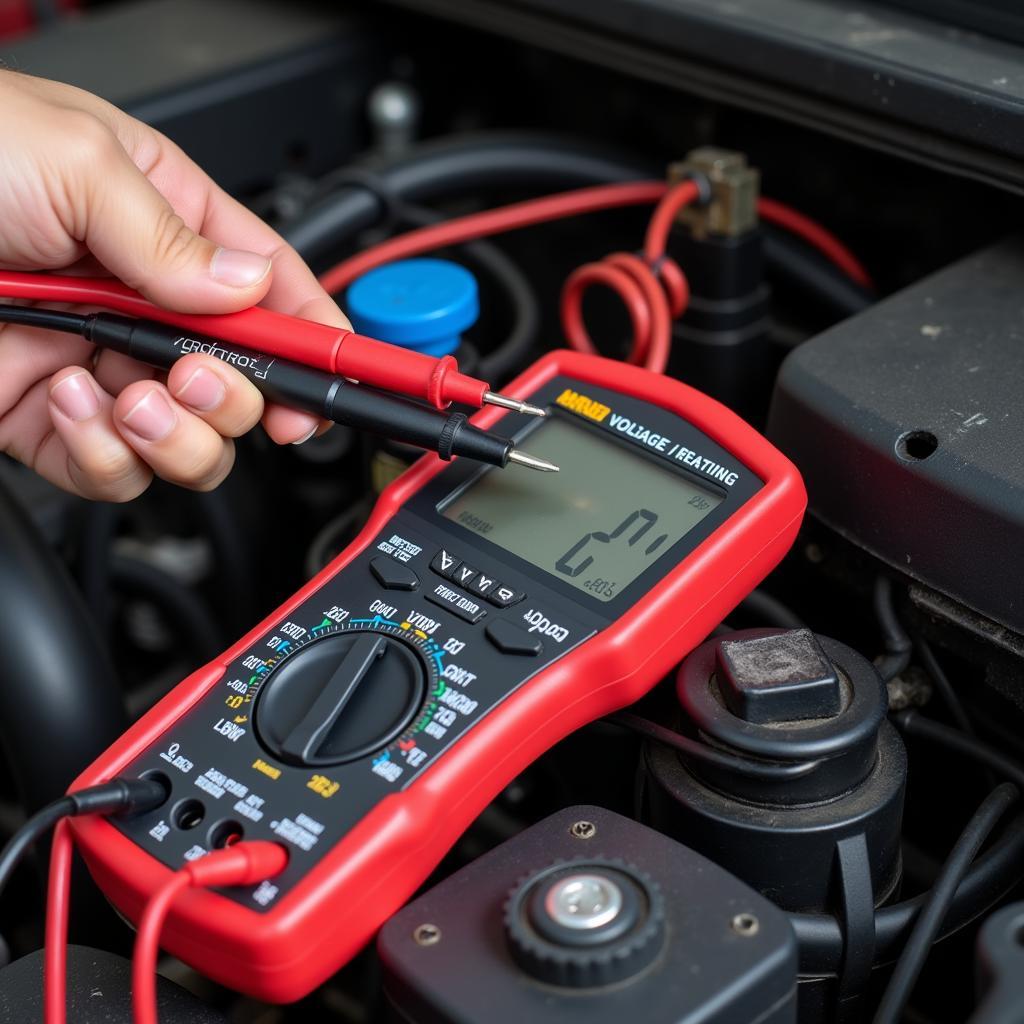Knowing the signs of a bad car battery is crucial for avoiding unexpected breakdowns. A failing battery can leave you stranded, so understanding the symptoms and knowing how to address them is essential for every car owner. This guide covers everything you need to know about recognizing a dying battery, from the obvious to the more subtle indicators.
Recognizing a Dying Car Battery: Key Indicators
Several signs point to a failing battery. Some are obvious, like a slow engine crank, while others are less noticeable. Being aware of all the possible symptoms can help you preemptively address the issue before it leaves you stranded.
Slow Engine Crank
One of the most common signs your battery is bad is a slow engine crank. When you turn the key, the engine struggles to turn over or cranks slowly before starting. This indicates the battery is struggling to provide enough power to start the engine.
Dim Headlights
Another telltale sign is dim headlights, especially when the engine is idling. If your headlights are significantly dimmer than usual, your battery might not be charging properly or holding a charge.
Clicking Sound When Turning the Key
If you hear a rapid clicking sound when you turn the key, but the engine doesn’t crank, your battery is likely dead or very weak. This clicking is the sound of the starter solenoid trying to engage but lacking the power from the battery to do so.
Electrical Issues
A failing battery can cause various electrical problems, such as flickering interior lights, malfunctioning power windows, and issues with the radio or other accessories. These issues occur because the battery isn’t providing consistent power to the vehicle’s electrical systems.
The Check Engine Light
Although the check engine light can indicate numerous problems, a failing battery can also trigger it. A faulty charging system or a bad battery can cause voltage fluctuations, which the car’s computer detects and flags with the check engine light.
 Testing Car Battery with Multimeter
Testing Car Battery with Multimeter
“A proactive approach to car maintenance, like regularly checking your battery’s health, can prevent inconvenient breakdowns and save you money in the long run,” says automotive expert, John Miller, ASE Certified Master Technician.
Advanced Diagnostics and Remote Solutions
Beyond the common signs, specialized diagnostic tools and software can provide a more accurate assessment of your battery’s health. These tools can measure the battery’s internal resistance and other critical parameters, providing a clearer picture of its condition. Remote diagnostic services are now available, allowing technicians to assess your vehicle’s systems, including the battery, from a distance. This saves time and allows for quicker diagnosis and repair. If you’re looking to upgrade your car’s audio system with Bluetooth connectivity, consider a usb bluetooth adapter for car radio.
How Old is Your Battery?
A car battery typically lasts between three and five years. Knowing the age of your battery can help you anticipate potential problems. If your battery is nearing the end of its expected lifespan, it’s wise to have it tested and consider replacing it proactively.
What to Do if You Suspect a Bad Battery
If you experience any of these signs, it’s important to have your battery tested. You can use a multimeter to check the voltage or take your car to a mechanic or auto parts store for a free battery test. “Don’t wait until your car leaves you stranded. A simple battery test can save you a lot of hassle,” advises Sarah Chen, Electrical Systems Engineer. If you are looking for a versatile Bluetooth solution for your car, consider checking out the usb wireless bluetooth adapter car radio. For older car models, a Beewi Bluetooth USB car radio adapter might be a good option.
Remember, a dead battery can sometimes be revived with a jump start. However, if your battery is consistently showing signs of failure, it’s likely time for a replacement. Check out our article about the usb bluetooth radio car for more information on upgrading your car’s audio system.
Conclusion
Recognizing the signs your battery is bad is crucial for maintaining your car and avoiding unexpected breakdowns. By being aware of the symptoms, you can take proactive steps to address the issue and ensure reliable starting and operation of your vehicle. Regular maintenance and timely replacement of a failing battery will keep you on the road and prevent inconvenient and potentially costly situations.
FAQ
-
How long do car batteries typically last? Most car batteries last between three and five years.
-
What causes a car battery to go bad? Factors like extreme temperatures, excessive vibration, and overcharging can shorten a battery’s lifespan.
-
Can I jump-start a completely dead battery? Yes, but it might only be a temporary solution if the battery is failing.
-
How much does a new car battery cost? The cost varies depending on the type and brand, but typically ranges from $50 to $200.
-
How can I prevent my car battery from dying prematurely? Regular maintenance, such as cleaning the terminals and ensuring the charging system is working correctly, can help prolong battery life.
-
Is it safe to drive with a bad battery? It’s not recommended as it can lead to unexpected breakdowns and potentially damage other electrical components.
-
Can a bad battery cause other car problems? Yes, a failing battery can cause issues with the electrical system, including starting problems, dimming lights, and malfunctioning accessories.

